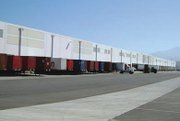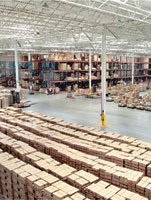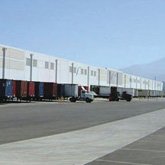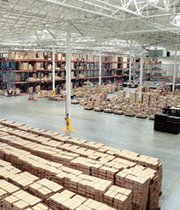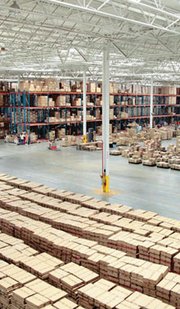Technology Helps Komar Distribution Expand
Komar Distribution Services, a division of New York–based Charles Komar and Sons, is on a mission to grow its business on the West Coast.
What began two years ago as a 350,000-square-foot distribution center in San Bernardino, Calif., for Charles Komar and Sons’ own brands—which include sleepwear and intimates labels—has now grown into Komar Distribution Services, a back-office and distribution-services provider. The company, which has operated a distribution center out of McAlester, Okla., for approximately 80 years, made the move west to satisfy its own distribution needs and quickly found brands eager to use its facilities and resources.
Ron Weissbrod, Komar’s vice president of business development, said Komar currently has approximately 10 customers being serviced out of the San Bernardino location. Those customers represent 15 percent to 20 percent of Komar’s business out of the West Coast location, and Weissbrod expects that number to more than double in the next several years. He declined to name Komar’s current clients. But Weissbrod said customers include domestic and international swimwear, sleepwear, intimates, sportswear, dress, and children’s and juniors brands that retail in major and big-box retailers through to specialty stores and independent boutiques. Client testimonials on Komar’s Web site count Liz Claiborne Sleepwear among its satisfied customers.
Down economy, interest up
As the economy forces companies to cut spending and reduce overhead, interest in Komar’s services has never been higher, Weissbrod said. “A good example is that of a swimwear company that only uses its warehouse 50 percent of the year, when it is actually shipping goods. The rest of the year the warehouse sits empty, but it is being paid for,” he said. “With this economy, companies are looking for ways to increase their efficiency.”
With its 40-plus employees and state-of-the-art facility, Komar’s San Bernardino location offers apparel imports, warehousing, distribution, supply-chain management, customer service, accounting and back-office systems for bigger operations as well as boutique brands. “Everyone needs to lower their overhead,” Weissbrod said.
He declined to discuss Komar’s fee structure, but Weissbrod said most companies, whether they have their own distribution and back-office operations or outsource them, would realize savings. One way Komar could fatten a company’s bottom line is by reducing the kinds of costly mistakes that are often made when shipping to new accounts as well as big box or major retailers. “We work with so many retailers—and have for nearly 100 years—that we know their specific requirements,” he said. Meeting shipping requirements and “virtually eliminating chargebacks” make for significant client savings.
Technology—which allows Komar to track goods from overseas factories onto boats, into and out of the warehouse, and onto the sales floor—is another money-saving bonus. “If a company knows where every single piece of product is at any given time—from the moment the order is placed to when it is cut and sewn down to whether it has been invoiced and when it is paid—they have so much more to work with and can be more agile,” Weissbrod said.
Tech appeal
With the influx of interest and business, Komar is keen on staying at the forefront of technology—from developing proprietary software that enables it to keep clients informed in real time as to the status of their goods to implementing Electronic Data Interchange (EDI) mapping and compliance with “nearly every major retailer.” The facility is also Radio Frequency Identification (RFID)–enabled, something that is becoming a key factor for companies selling goods to the likes of Wal-Mart and other big-box stores.
“We are very technology-focused,” said Melinda Cook, Komar’s director of customer service. “Our array of services and clients requires us to be at the forefront of what is going on. It’s how we save our clients money and run our own business more efficiently.”
To communicate with clients, Komar has developed a software that is installed directly onto clients’ computers. The dashboard, as it is called, gives clients constant access to reports such as sales reporting and history, gross margin analysis, style master management, reserve and bulk order management, inventory forecasting, production-order status, and real-time inventory visibility and control, a release from the company states. “The software makes everything visible and transparent. And it eliminates the hundreds of e-mails from different people that would otherwise be necessary from the moment a purchase order is written until it is delivered,” Cook said.
Currently, each client’s record is updated multiple times a day so they can track the progress of their goods in real time.
“The minute a shipment passes through our dock doors, it is in our system,” Weissbrod said. “That means a client can turn stock as soon as it comes in— and that is something that is a big advantage in the current market,” he said.
